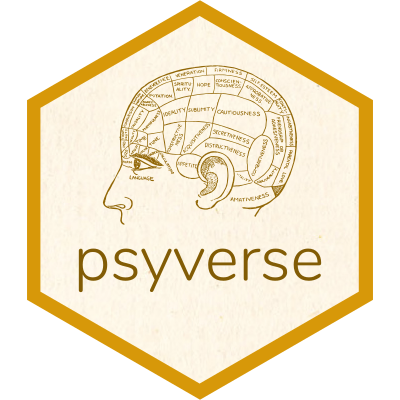psyverse: Decentralized Unequivocality in Psychological Science
The pkgdown website for this project is located at https://psyverse.one.
In psychology, many different guidelines exist for developing measurement instruments and manipulations of constructs. When conducting empirical research or secondary research, therefore, it is important to have a clear idea, and clearly communicate, which guidelines are followed. However, these guidelines are fragmented, and no universal consensus exists regarding how any construct must be measured or manipulated. Therefore, developing one ‘final’ authoritative list or taxonomy is not feasible or even desirable. At the same time, it is important that people clearly communicate their ‘study-specific taxonomy’. The psyverse package makes it possible to combine these two goals.
For more background information on the concept underlying the Decentralized Construct Taxonomies, see the reasoning set out in Peters & Crutzen (2017a, 2017b) and Crutzen & Peters (2018). In brief, in those papers the following premises are postulated:
- Psychological constructs do not exist as such, but instead are useful metaphors that enable communication about, and measurement and manipulation of, aspects of the human psychology.
- These constructs have varying degrees of specificity and levels of aggregation, and are therefore often represented in theories as influencing or causing one another.
From these premises it follows that is is not feasible (or desirable) to develop one ‘final’ taxonomy of psychological constructs or of manipulations of psychological constructs. Instead, multiple taxonomies exist, each of which has different uses. For example, in behavior change research, one taxonomy has been developed that is well-suited for describing intervention content but that is not useful when developing interventions (Abraham & Michie, 2008), and another that is well-suited for developing interventions, but is in its present form less useful for coding interventions (Kok et al., 2016).
Similarly, different theories that explain behavior postulate different psychological variables as important predictors of behavior. These variables generally overlap with each other: usually between theories, but also within the same theory. For example, the main three determinants in the Reasoned Action Approach are postulated to correlate (Fishbein & Ajzen, 2010), correlations that are empirically almost impossible to distinguish from structural composition (Peters & Crutzen, 2017a). Where different theories contain the same construct, they often contain slightly different definitions and have different operationalisational implications.
However, given that psychological constructs do not correspond to natural kinds (Peters & Crutzen, 2017; also see e.g. Fried, 2017b), there is no way to settle on ‘the best’ definitions or operationalisations. Expert consensus is no sensible instrument, because the opinions and preferences of experienced researchers reflect, to an unknown degree, their training; and therefore, convictions from decades ago (which does not necessarily make them wrong; but at the same time does nothing to make it likely that they are right). Neither can this problem be solved statistically. For example, correlation strengths also reflect artefacts such as correlated measurement error that render the assumption that correlation strengths can be used to infer ‘the best’ definitions or operationalisations circumspect (e.g. nonsense items obtain equally high internal consistencies as items that appear sensible at face value; Maul, 2017).
Perhaps then, it is no surprise that in practice, operationalisations often vary between studies, with studies often using a wide array of items, not to mention the variation in languages, target behaviors, and cultures. For example, a recent review of self-identity operationalisations identified hundreds of different items purportedly measuring the same construct (Snippe, Peters & Kok, 2019). These different measurement instruments purporting to measure the same construct turn out to measure different things when this claim is tested (see Fried, 2017 for depression; Weidman, Steckler & Tracy, 2017, for emotions; Warnell & Redcay, 2019, for theory of mind; and Williams & Rhodes, 2016a, for self-efficacy; a crowd-sourced list is available at https://docs.google.com/document/d/1vaq0U3_U2PEgouPLteUjab15aVxyEv2IVdbOxTErkHM). And when put to the test, many commonly used measurement instruments turn out to be invalid in themselves (Hussey & Hughes, 2019). As a consequence of this pluriformity and lack of validity, research syntheses suffer, and in communication about research results, a lot is lost in translation.
However, this variation observed in practice is hard to reconcile with the need for consistency in communication. How can this be realised given that there’s no scientifically justifiable way to identify ‘the best’ definitions or operationalisations?
This is the problem Decentralized Construct Taxonomies (DCTs) aim to solve.
Installation
You can install the released version of psyverse from CRAN with:
install.packages('psyverse');You can install the development version of psyverse from GitLab with:
remotes::install_gitlab('r-packages/psyverse');(assuming you have remotes installed; otherwise, install that first using the install.packages function)
 psyverse 📦
psyverse 📦